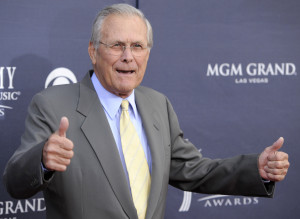WASHINGTON -- Investigative journalist Bob Woodward on Tuesday rebutted former Defense Secretary Donald Rumsfeld’s claims that he had always been skeptical about U.S. efforts to promote democracy in Iraq following the 2003 invasion.
“If you look at Rumsfeld’s memoir, and what the record is, and things he said on the record and hours of interviews with me, often months after the events -- it’s just a total contradiction,” Woodward said on MSNBC’s “Morning Joe.”
Woodward’s remarks were a response to a recent interview in which Rumsfeld said he had been unsure from the start that the U.S. could build democracy in Iraq after overthrowing its former president, Saddam Hussein.
"I'm not one who thinks that our particular template of democracy is appropriate for other countries at every moment of their histories,” Rumsfeld told The Times of London on Friday. “The idea that we could fashion a democracy in Iraq seemed to me unrealistic. I was concerned about it when I first heard those words.”
Woodward, who wrote four books chronicling the inside politics of the George W. Bush administration, asserted on Tuesday that Rumsfeld "was indeed one of the architects of the war.”
The journalist has previously pushed back against the former defense secretary's description of his role in the Iraq war. In 2011, he described Rumsfeld’s memoirs, Known and Unknown, as “one big clean-up job, a brazen effort to shift blame to others -- including President Bush -- distort history, ignore the record or simply avoid discussing matters that cannot be airbrushed away.”
In a declassified memo from July 2002, Rumsfeld described his plan for fostering democracy in Iraq after ousting Hussein: “In Iraq, there are many undesirable opposition elements -- a Communist faction, Sunni fundamentalists, and radical Sh'ia -- all with presumably some support around the country and in some institutions,” he wrote. “Organizing the democratic opposition groups that we favor into a real political-military force is essential to preempt these groups, avoid a political vacuum, and avoid a chaotic post-Saddam free-for-all.”
In a speech seven weeks after the invasion of Iraq, Rumsfeld laid out the Bush administration’s hope that Iraq would blossom into a democratic ally of the U.S. in its global war on terror.
“If Iraq -- with its size, capabilities, resources and its history -- is able to move to the path of representative democracy, however bumpy the road, then the impact in the region and the world could be dramatic,” he said. “Iraq could conceivably become a model -- proof that a moderate Muslim state can succeed in the battle against extremism taking place in the Muslim world today.”
Original Article
Source: huffingtonpost.com/
Author: Jessica Schulberg
“If you look at Rumsfeld’s memoir, and what the record is, and things he said on the record and hours of interviews with me, often months after the events -- it’s just a total contradiction,” Woodward said on MSNBC’s “Morning Joe.”
Woodward’s remarks were a response to a recent interview in which Rumsfeld said he had been unsure from the start that the U.S. could build democracy in Iraq after overthrowing its former president, Saddam Hussein.
"I'm not one who thinks that our particular template of democracy is appropriate for other countries at every moment of their histories,” Rumsfeld told The Times of London on Friday. “The idea that we could fashion a democracy in Iraq seemed to me unrealistic. I was concerned about it when I first heard those words.”
Woodward, who wrote four books chronicling the inside politics of the George W. Bush administration, asserted on Tuesday that Rumsfeld "was indeed one of the architects of the war.”
The journalist has previously pushed back against the former defense secretary's description of his role in the Iraq war. In 2011, he described Rumsfeld’s memoirs, Known and Unknown, as “one big clean-up job, a brazen effort to shift blame to others -- including President Bush -- distort history, ignore the record or simply avoid discussing matters that cannot be airbrushed away.”
In a declassified memo from July 2002, Rumsfeld described his plan for fostering democracy in Iraq after ousting Hussein: “In Iraq, there are many undesirable opposition elements -- a Communist faction, Sunni fundamentalists, and radical Sh'ia -- all with presumably some support around the country and in some institutions,” he wrote. “Organizing the democratic opposition groups that we favor into a real political-military force is essential to preempt these groups, avoid a political vacuum, and avoid a chaotic post-Saddam free-for-all.”
In a speech seven weeks after the invasion of Iraq, Rumsfeld laid out the Bush administration’s hope that Iraq would blossom into a democratic ally of the U.S. in its global war on terror.
“If Iraq -- with its size, capabilities, resources and its history -- is able to move to the path of representative democracy, however bumpy the road, then the impact in the region and the world could be dramatic,” he said. “Iraq could conceivably become a model -- proof that a moderate Muslim state can succeed in the battle against extremism taking place in the Muslim world today.”
Original Article
Source: huffingtonpost.com/
Author: Jessica Schulberg

No comments:
Post a Comment